 Petzlover
Petzlover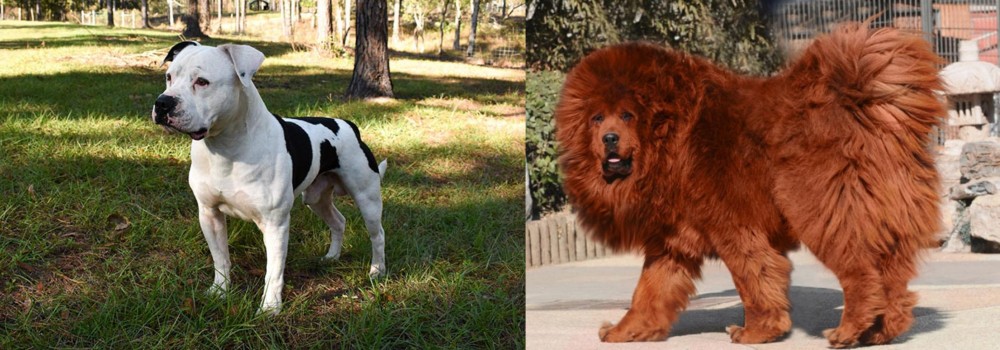 American Bulldog is originated from United States but Himalayan Mastiff is originated from India. Both American Bulldog and Himalayan Mastiff are having almost same height. American Bulldog may weigh 24 kg / 52 pounds lesser than Himalayan Mastiff. Both American Bulldog and Himalayan Mastiff has almost same life span. Both American Bulldog and Himalayan Mastiff has almost same litter size. American Bulldog requires Low Maintenance. But Himalayan Mastiff requires Moderate Maintenance
American Bulldog is originated from United States but Himalayan Mastiff is originated from India. Both American Bulldog and Himalayan Mastiff are having almost same height. American Bulldog may weigh 24 kg / 52 pounds lesser than Himalayan Mastiff. Both American Bulldog and Himalayan Mastiff has almost same life span. Both American Bulldog and Himalayan Mastiff has almost same litter size. American Bulldog requires Low Maintenance. But Himalayan Mastiff requires Moderate Maintenance
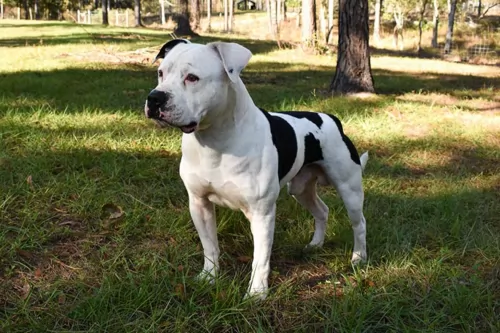 Following World War II, the American Bulldog was almost extinct.
Following World War II, the American Bulldog was almost extinct.
Thanks to John D. Johnson from Summerville, Georgia the breed is still with us today. He gathered the best dogs he could find throughout the rural South and bred them back into popularity among his family and other rural families. His father bred the American Bulldog before John did and they have bred them longer than any other in any part of the world. His dogs were regularly used for tracking, hunting, guarding, watchdog and weight pulling. At some point Alan Scott joined Johnson breeding other bulldogs to Johnson's and forming the Standard American Bulldog.
The American Bulldog/ is popular today as a family pet and companion as well as a working dog.
 The Himalayan Mastiff or Tibetan Mastiff is an ancient breed. Bred to be guardians of the flock, they could take care of leopards and wolves or anything else that tied to hurt the flock. The Himalaya Mastiff is found in the Himalayan area of Tibet. They are descendants of the Tibetan dogs that developed almost any Mastiff or Molosser on earth. They may have been in the mountains since the early 1100 BC. and have been fairly isolated. It was in this isolation that the Himalayan Mastiff developed.
The Himalayan Mastiff or Tibetan Mastiff is an ancient breed. Bred to be guardians of the flock, they could take care of leopards and wolves or anything else that tied to hurt the flock. The Himalaya Mastiff is found in the Himalayan area of Tibet. They are descendants of the Tibetan dogs that developed almost any Mastiff or Molosser on earth. They may have been in the mountains since the early 1100 BC. and have been fairly isolated. It was in this isolation that the Himalayan Mastiff developed.
Their function at that time was mostly to guard property. In some circumstances an entire village is guarded by one dog. It was also during this period that the breed was taught to be aggressive by tying them up as puppies. They guarded families while the men moved the village flock higher up in the mountains. They stayed in isolation until the mid-1800’s when the Queen of England was given a Himalayan Mastiff. For thousands of years, this dog was a nomad.
Soon the breed was being exported to England. A standard was developed, and the British began to breed them. Next, they were exported to Nepal, Afghanistan, India and the United States. They are rare in Tibet these days but more popular than ever in England and the United States. The first American Himalaya Tibetan Mastiff Association came into being in 1974 and in 2006 it was recognized by the AKC.
Today in the West, the Himalayan is a domesticated, family dog. It hardly fits in an apartment of course. These new western Himalayan Mastiffs are more easy- going than the Tibetan ones, but they are still wary of strangers and somewhat aloof. They are also still very protective and nocturnal. They are smart, independent and stubborn. They are not easy to train but socialization and obedience training is essential.
A study done in 2011 showed that it is very likely that many large breed dogs were descended from this Mastiff. This includes the St. Bernard, the Rottweiler, Bernese Mountain Dog and the Great Pyrenees. Later studies showed that the Mastiff’s ability to survive in the rare air of the Himalayans was due to interbreeding with Tibetan wolves in ancient, prehistoric times. Now they are competing in the Westminster Kennel Club Dog Show.
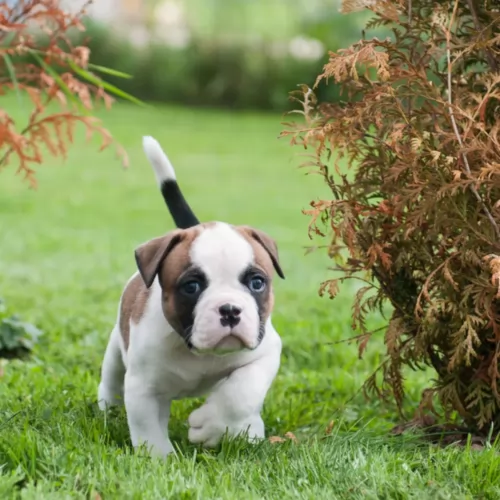 The American Bulldog is a powerful and muscular dog in a sturdy and compact frame. The female is more refined than the heavy boned and stocky male, but both genders are athletic, agile and quick. The have large heads, strong jaws, a muscular neck and with a moderately deep and wide chest.
The American Bulldog is a powerful and muscular dog in a sturdy and compact frame. The female is more refined than the heavy boned and stocky male, but both genders are athletic, agile and quick. The have large heads, strong jaws, a muscular neck and with a moderately deep and wide chest.
They have a square head, with muscular cheeks and a clearly defined furrow between his eyes. With broad, square and strong muzzles, they have a reverse scissors, scissors, moderate underbite and an even bite. Ears come in a variety of shapes and sizes and eyes can be any color as well. The nose however should be black and lips black as well. Their legs are strong, heavy boned and straight with well-defined muscles in the hindquarters. Finally ,they have a thick, low set tail that comes to a point at the end.
 The Himalayan Mastiff is a giant, massive dog longer than it is tall. The breed has a heavy, broad head and square muzzle. They have black noses, a level bite and almond shaped, slanted, deep set eyes. They are brown, and the ears hang close to the head. They are heavy, muscular and sturdy. They have a feathered tail curving over their back. With a heavy, thick double coat and mane they resemble a lion at times. The coat can be brown, black, and gray-blue with gold or tan markings. These are impressive and noble dogs, athletic, with cat like feet. They are agile and light on their feet.
The Himalayan Mastiff is a giant, massive dog longer than it is tall. The breed has a heavy, broad head and square muzzle. They have black noses, a level bite and almond shaped, slanted, deep set eyes. They are brown, and the ears hang close to the head. They are heavy, muscular and sturdy. They have a feathered tail curving over their back. With a heavy, thick double coat and mane they resemble a lion at times. The coat can be brown, black, and gray-blue with gold or tan markings. These are impressive and noble dogs, athletic, with cat like feet. They are agile and light on their feet.
According to some breeders there are two different kinds or types of Himalayan Mastiff. These are the Tsang-khyi or the monastery mastiff type and the Do-khyi or the nomad mastiff type. The monastery is a heavier, taller dog who face is very wrinkled while the nomad is a leaner dog with less facial wrinkles. In any litter there can be both kinds. The kind of work that was given to each dog was dependent on their type. The Monastery kind is given stationary jobs and the nomad kind got the active jobs.
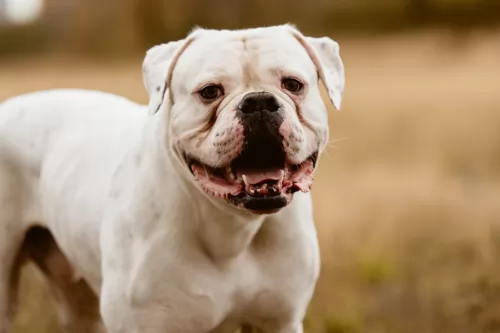 The American Bulldog is characteristically loyal, brave and reliable. It is a friendly, gentle dog that truly loves children. There is not a hostile bone in his body despite his history and reputation for bull baiting. Though he is protective of its family and affectionate with most, he still needs a human companion who is strong willed and a genuine pack leader. Without this he might become aggressive around other dogs and pets. They are immensely self-confident and they do slobber and drool and will become excited and hard to handle without daily exercise of both their body and their minds.
The American Bulldog is characteristically loyal, brave and reliable. It is a friendly, gentle dog that truly loves children. There is not a hostile bone in his body despite his history and reputation for bull baiting. Though he is protective of its family and affectionate with most, he still needs a human companion who is strong willed and a genuine pack leader. Without this he might become aggressive around other dogs and pets. They are immensely self-confident and they do slobber and drool and will become excited and hard to handle without daily exercise of both their body and their minds.
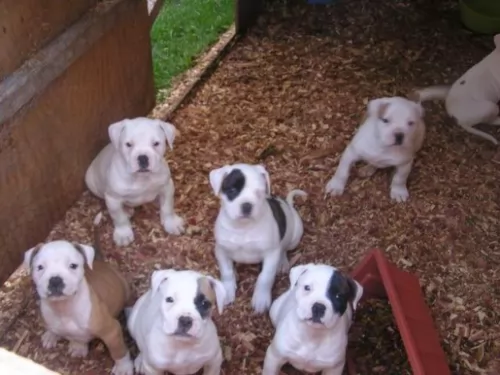 Though generally healthy, the American Bulldog is prone to a few problems.
Though generally healthy, the American Bulldog is prone to a few problems.
This is a serious issue in many breeds of dogs and is especially prevalent with the American Bull Dog. This may seem ironic in such a short legged dog but it is unfortunately very common. It is a genetic disorder that causes the bones in the joint to separate and causes the dog much pain and lameness.
Due to skin folds you need to be care and watch for irritation and infection in the folds. They are also prone to ear infections.
The American Bulldog is prone to overeating and all the health issues that presents. With short legs and a genetic predisposition to arthritis and hip dysplasia, obesity is a real health risk for your bulldog.
 Being a large breed of canine, the Himalayan Mastiff has some of the typical health issues of large dogs. However, they also face a serious genetic disorder as well.
Being a large breed of canine, the Himalayan Mastiff has some of the typical health issues of large dogs. However, they also face a serious genetic disorder as well.
Canine Inherited Demyelinative Neuropathy (CIDN) – a fatal disorder seen in puppies by seven weeks of age. Puppies die before they are 5 months old.
 This breed will eat less than you think they should but don’t overfeed. Puppies need a solid dry food for large dogs. You can free feed 1 cup three times per day.
This breed will eat less than you think they should but don’t overfeed. Puppies need a solid dry food for large dogs. You can free feed 1 cup three times per day.
For dogs over a year old you can free feed anywhere from two to four cups of dry food per day. Unlike many other breeds, the Himalaya Mastiff will only eat when hungry and they may not eat more than once a day. They will not overeat. The males might not eat at all when females are in season if they are around them.
They have good strength and athletic ability.
The Himalayan Mastiff needs regular, routine walks. It is important during these walks that the human leads the way, or the dog heals. Do not overwork a young Himalayan Mastiff. They need work related jobs like structured play time, walking the boundary of their territory, playing frisbee or catch. They work and play in short bursts then rest.